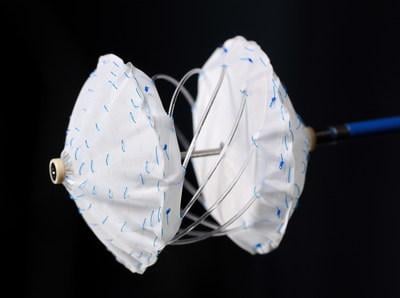
July 1, 2020 — Carag AG announced receiving U.S. Food and Drug Administration (FDA) Investigational Device Exemption (IDE) approval for its Carag Bioresorbable Septal Occluder (CBSO). The CE-marked CBSO is the first-ever transcatheter septal occluder with bioresorbable, metal-free framework. Carag's first U.S. trial is designed to enroll up to 250 patients in a staged study approach, the largest clinical trial for the company to date.
Atrial septal defects (ASD) are currently treated with transcatheter implants with a metal framework that permanently clamps the septum. The long-term presence of metal in the heart can lead to rare but severe complications, such as erosion, arrhythmia and thrombus formation. Moreover, current devices limit treatment options for future heart interventions requiring septum crossing, such as mitral valve repair or replacement, left atrial appendage and ablation.
"Based on the data seen so far, we are very hopeful that a metal-free bioresorbable framework has the potential to reduce the risk of late complications for patients," explained Larry Latson, M.D., pediatric cardiologist and specialist in adult congenital heart disease at Joe DiMaggio Children's Hospital (FL) and who, along with Saibal Kar, M.D. (Los Robles Medical Center, CA), is national co-Principal Investigator for the Carag U.S trial. "With heart procedures requiring septal crossing on the rise, a framework that dissolves when no longer needed would improve future treatment options. Both benefits would represent major advancements in ASD treatment," he added.
Results from Carag's first-in-human trial[1] conducted in Germany demonstrated that CBSO is easy to use, with excellent closure results at procedure and at two years follow-up, with no serious device-related complications reported. CBSO is CE-marked for use in the European Union and it is currently being implanted as part of a post-market registry in selected centers in Germany and Switzerland.
The prospective, multi-center, U.S. clinical trial designed to enroll up to 250 patients in a staged study approach to evaluate the safety and efficacy of the CBSO in patients with clinically significant ASD.
"We designed the CBSO to achieve a more natural intact septum by eliminating the metal framework, which has no purpose once the septum is healed. Our novel approach enables pediatric and adult cardiologists to perform trancatheter septal occlusions today that will not undermine future left sided interventional procedures requiring transseptal access," explained Jérôme Bernhard, Carag CEO. "We are looking forward to offering eligible patients a novel treatment approach for septal occlusion," he stated. Carag expects trial enrollment to begin in late 2020.
Patients with ASD have an opening in the septum between the atria that allows blood to return from the left to the right side of the heart. The excess of blood in the right ventricle and lungs may cause enlargement of the right ventricle, shortness of breath, fatigue and palpitations. These openings in the heart are either due to a congenital heart defect, affecting nearly six in 10,000 births, or to a cardiac procedure during which a physician crossed the septum to carry out an intervention on the left side of the heart, such as mitral valve repair.
For more information: www.carag.com/CBSO
Reference:
1. Söderberg B, Vaskelyte L, Gafoor S, Hofmann I, Mellmann A, Bernhard J, Sievert H. Prospective single center First in Human (FIH) clinical trial to evaluate the safety and effectiveness of a septal occluder with bioresorbable framework in patients with clinically significant atrial septum defect (ASD) or patent foramen ovale (PFO). Journal of the American College of Cardiology, Vol 68, No 18, Suppl B, 2016.


 January 05, 2026
January 05, 2026 









